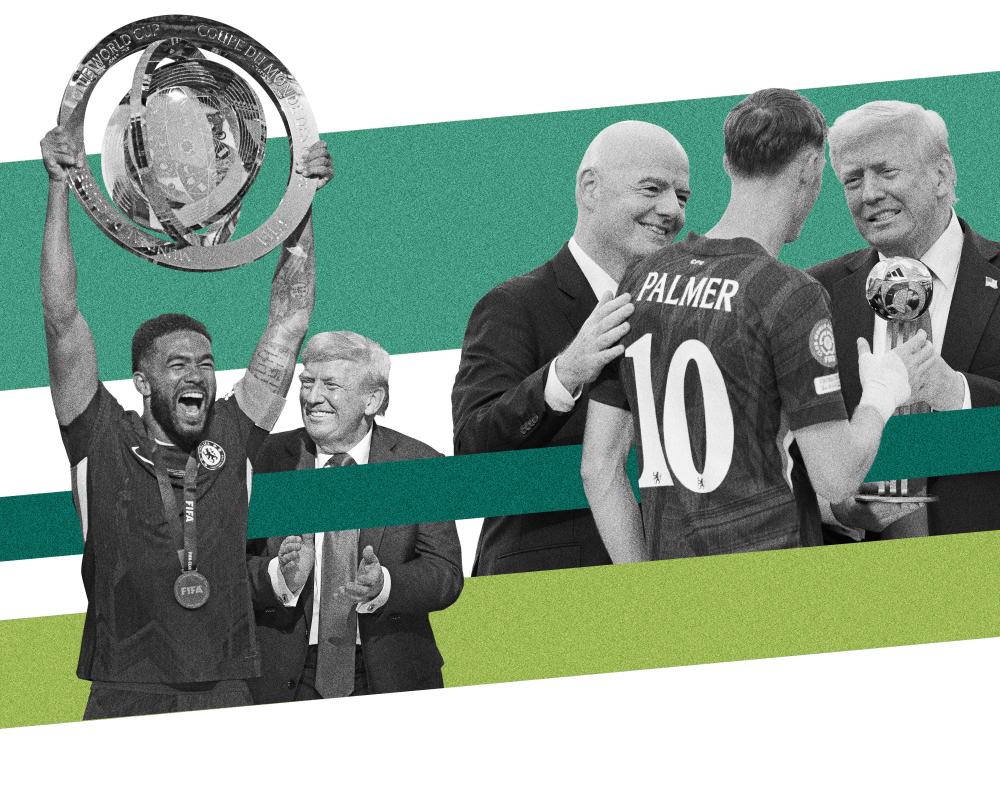For the first four weeks of the 2025 Club World Cup, there had been the danger that the tournament would soon be largely forgotten. There is no danger of that after the final. There had been unease after the 2022 World Cup final at the way Qatar inserted itself into the trophy presentation by draping a bisht over Lionel Messi, but at least the Emir kept his distance. Donald Trump, by contrast, placed himself front and centre of the celebrations – and he was soon joined by the Fifa president, Gianni Infantino, who has a pathological fear of missing out, and must follow his great ally in all things.
And so we were presented with a grimly perfect image of this misguided tournament, a celebrating football team struggling to be seen from behind the politicians who took centre stage. The confusion of Cole Palmer and Reece James at Trump’s continued presence was clear. History, and not just football history, will not forget such shameless grandstanding, or Fifa’s complicity in allowing football to be hijacked by a national leader.
Advertisement
Related: From Palmer and domes to Musiala and turf: Club World Cup winners and losers
It was a day the ramifications of which will be sifted for years. As a footballing spectacle, it was remarkable, a game in which Palmer produced a performance to elevate him to global stardom, in which Robert Sánchez did much to quiet his many critics, in which Enzo Maresca announced himself as a tactician of the highest rank.
There had been plenty of intrigue earlier in the tournament – Al-Hilal’s last-16 victory over Manchester City and Real Madrid’s capitulation in the semi-final perhaps most notably – but they had always been undercut by doubts as to how seriously each side was taking it. But PSG’s determination to add the world title to the Champions League crown they won in May was obvious and, in the final, they were outplayed to a startling degree.
Luis Enrique’s side had essentially been untouchable since the turn of the year, not just winning games but looking sharper than opponents, on another tactical level. They had outclassed Madrid in the semi-final to the extent that the game was done within 20 minutes. Yet the final was lost by half-time as their left flank was repeatedly over-run. Khvicha Khvaratskelia, whose defensive work is usually so striking, didn’t make a single tackle or interception (PSG’s front three as a whole managed just one regain between them) and Fabián Ruiz was bypassed so that Nuno Mendes, who for a year has seemed obviously the best left-back in the world, was repeatedly exposed, sometimes to Malo Gusto but sometimes, more dangerously, to Palmer.
Advertisement
Related: Club World Cup dismissed as a Fifa ‘fiction’ by head of players’ union
Palmer produced one of the great final performances, scoring the first with a great finish, the second with a great finish after a dummied pass of almost comical effectiveness and then setting up the third with a barrelling run and perfectly calibrated pass for João Pedro. Perhaps PSG were disadvantaged by having played in the second semi-final; perhaps in the extreme heat an extra 24 hours of rest makes a huge difference. Still, it’s been a long time since anybody has taken Luis Enrique’s PSG apart like that – even if it took two exceptional saves from Sánchez to prevent PSG getting a second-half goal that might have made the denouement more anxious than it was.
There have been plenty who have doubted Maresca’s tactical approach, his apparent over-caution, his obsession with avoiding risk. But on Sunday, he clearly got the gameplan right. Using Pedro Neto as an auxiliary wing-back helped negate the forward surges of Achraf Hakimi but it was on the other flank, the way space was created for Palmer, that the game was won. These were moments that will define careers and, in so doing, offer legitimacy and prestige to the Club World Cup. As world champions, after a performance like that, with a squad of such depth, Chelsea have to be considered serious contenders for the Premier League title.
But in the end, the football seemed an afterthought. There is always something uncomfortable to the European mind in the militarism of US sporting fanfare (which has begun, regrettably, to seep into the FA Cup final). Why was the Star-Spangled Banner played before kick-off? When has the host’s anthem ever previously been played like that at a Fifa event? Why was there a fly-over of military planes?
Advertisement
By the trophy presentation, that had become something much more sinister.
Was the US hosting football, or was football hosting the US? Or rather a particular vision of the US represented by Trump? Fifa has just opened offices in Trump Tower: Infantino’s alliance with the president is both committed and alarming. And having pushed through his vision of the Club World Cup with all its flaws without meaningful consultation, what next for Fifa? Checks and balances simply don’t apply any more.
-
This is an extract from Soccer with Jonathan Wilson, a weekly look from the Guardian US at the game in Europe and beyond. Subscribe for free here. Have a question for Jonathan? Email soccerwithjw@theguardian.com, and he’ll answer the best in a future edition.
Read the full article here


